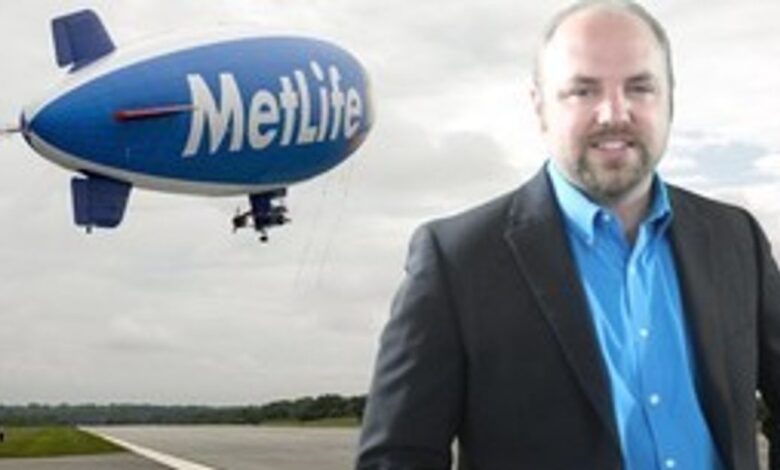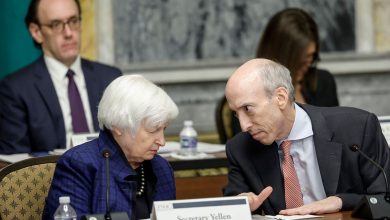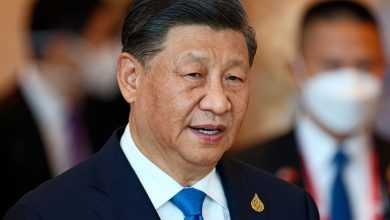Blimp company owner gets 5 1/2 years for stealing $8 million in COVID aid

[ad_1]
Oh, the humanity.
The owner of the world’s largest blimp company has been sentenced to 5½ years in prison for stealing nearly $8 million in COVID-19 aid, which, according to prosecutors, he used to buy a private island and a luxury ski resort, among other real-estate investments
Patrick Parker Walsh, 42, of Williston, Fla., submitted dozens of fraudulent applications to government relief programs for his company, the Airsign Airship Group, which operates a fleet of 15 advertising blimps around the world, federal prosecutors in Florida said.
The applications, which sought more than $14 million in aid from the Payroll Protection Program and in economic-injury disaster loans, highly inflated the number of people who worked for Walsh’s company and claimed dormant subsidiaries were active businesses, prosecutors said.
In all, Walsh received $7.8 million in aid, investigators said.
But instead of using the money to save his business, prosecutors said, Walsh funneled much of it into the purchase of high-priced real estate, including a private island in the Gulf of Mexico; a ski resort in Jackson Hole, Wyo.; and to support a 78-acre farm he and his family owned in Florida.
“Patrick Walsh abused a program that was designed to ease suffering caused by the COVID-19 pandemic,” said FBI special agent Sherri Onks. “Instead of using millions of dollars in federal funds to help keep struggling businesses afloat and honest workers employed, he selfishly diverted it for his own personal gain.”
Walsh pleaded guilty to bank fraud and wire fraud in August. In addition to his prison term, Walsh was ordered to pay back the $7.8 million.
An attorney for Walsh had no immediate comment. In court papers, his legal team argued that he had not been motivated by greed but was genuinely trying to keep his business going in order to support his wife and 11 children and the families of his employees.
“Unlike many of the PPP fraud cases that have been prosecuted nationally, Mr. Walsh had actual, viable businesses with employees. While he took advantage of a program and obtained loan proceeds beyond what his companies qualified for, Mr. Walsh did not use the loan proceeds to go on lavish trips or to buy expensive cars, boats, or jewelry. Mr. Walsh paid his employees, and he used the majority of the proceeds to keep his businesses afloat and to keep his staff employed,” his lawyers wrote in a court filing.
Walsh was the founder of Airsign Airship Group, according to his LinkedIn page. He had managed to put the company together in 2017 through the acquisition of several other blimp operations but had relied upon high-interest loans to do it, his lawyers said. While the company participated in numerous advertising campaigns for major corporate clients, such as Discovery Channel’s
WBD,
Shark Week, Carnival Cruise Lines
CCL,
and Outback Steakhouse
BLMN,
almost all of its bookings dried up at the beginning of the pandemic.
“Unfortunately, Mr. Walsh viewed the loans as inexpensive capital to replace his high-interest debt and became aggressive in his loan applications, seeking funds over and above [those to] which his companies were entitled. To obtain the loans, Mr. Walsh made poor choices, including fabricating documents when necessary to obtain the loans,” his lawyers admitted.
In court papers, Walsh pleaded for leniency, pointing to his Christian faith and long-running missionary work in Central America.
But the federal judge in the case, Allen C. Winsor, said the details of the case were impossible to ignore.
“There is too much fraud out there, particularly with PPP,” Winsor said, according to the Gainesville Sun. “There is a greater need to deter white-collar crime.”
Walsh accepted his fate, telling the court: “I tell my children that it’s in the moments when no one is watching that you can measure a man’s character. Unfortunately for me, when I was in that situation, I failed.”
[ad_2]
Source link



